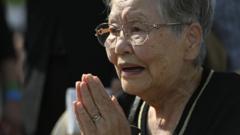In a poignant ceremony that unfolded on Wednesday, Japan marked a significant milestone—the 80th anniversary of the atomic bombing of Hiroshima. This heartbreaking chapter in history, deemed a tragedy that took the lives of over 200,000 individuals, was commemorated with a poignant silent prayer led by Japanese Prime Minister Shigeru Ishiba. The Prime Minister, accompanied by Hiroshima's Mayor Kazumi Matsui and various global representatives, illuminated the pressing issues surrounding nuclear weaponry. Mayor Matsui's speech served as a somber reminder of the world's "accelerating trend toward military build-up," which he argued signaled a blatant disregard for vital lessons from history.
Witness accounts from atomic bomb survivors aired during the observance, further driving home the need for nuclear disarmament. Shingo Naito, who lost his family in the bombing, vividly recounted his father's suffering as a senior survivor. Naito's story ignites the creative responses of students tasked with transforming painful memories into art. As the world inches toward an uncertain future, the nuclear Non-Proliferation Treaty faces challenges, with critical implications for global peace. Advocates underscore the need for action against nuclear weapons' persistence, with calls for Japan to support the Treaty on the Prohibition of Nuclear Weapons.
Amid protests demanding the elimination of these destructive arms, survivors echoed the urgent necessity for global outrage against the specter of atomic weaponry—remarkably heightened by recent conflicts in Gaza and Ukraine. Now more than ever, the voices of Hiroshima’s survivors advocate for a world free from the looming threat of nuclear destruction, stressing the importance of pushing leaders to prioritize disarmament in order to secure a peaceful existence for all.
Witness accounts from atomic bomb survivors aired during the observance, further driving home the need for nuclear disarmament. Shingo Naito, who lost his family in the bombing, vividly recounted his father's suffering as a senior survivor. Naito's story ignites the creative responses of students tasked with transforming painful memories into art. As the world inches toward an uncertain future, the nuclear Non-Proliferation Treaty faces challenges, with critical implications for global peace. Advocates underscore the need for action against nuclear weapons' persistence, with calls for Japan to support the Treaty on the Prohibition of Nuclear Weapons.
Amid protests demanding the elimination of these destructive arms, survivors echoed the urgent necessity for global outrage against the specter of atomic weaponry—remarkably heightened by recent conflicts in Gaza and Ukraine. Now more than ever, the voices of Hiroshima’s survivors advocate for a world free from the looming threat of nuclear destruction, stressing the importance of pushing leaders to prioritize disarmament in order to secure a peaceful existence for all.


















